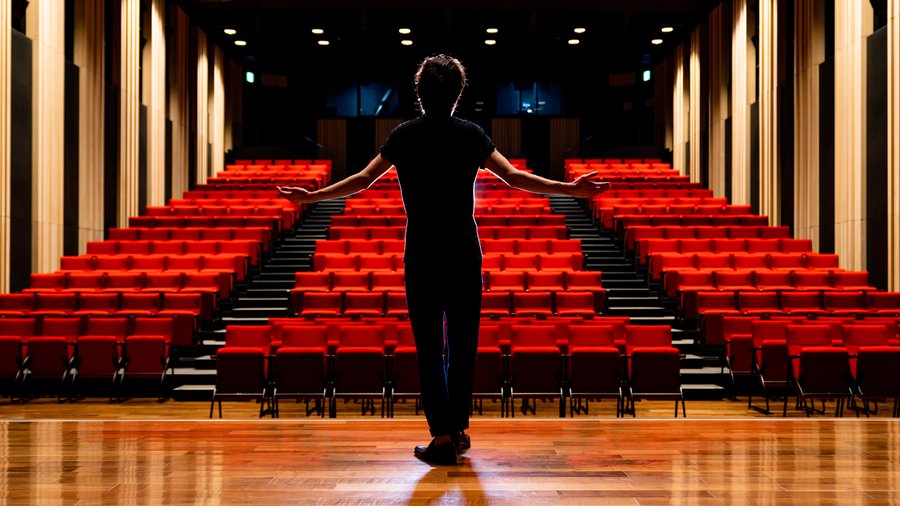Salzburg Global Fellow Nicole Jerr explores how theater can challenge U.S. narratives about Asia and Asian Americans
This article was written by Salzburg Global Fellow Nicole Jerr, who attended the Salzburg Global American Studies program on “Crossing the Pacific: The Asian American Experience in U.S. Society and Discourse” in September 2024.
Although the so-called “Great Power Competition” between the U.S. and China centers around achieving global political dominance, portrayals of Asians and Asian Americans in literature, popular culture, and the arts nevertheless take on pressing importance within this context. In the U.S., the fear-mongering rhetoric of the “Great Power Competition” traffics in dehumanizing techno-orientalist misrepresentations and caricatures, often making little distinction between the Chinese Communist government, the People’s Liberation Army, and the Chinese people.
The trickle-down effect of this “yellow peril” rhetoric further blurs the line between those who are Asian and those who are Asian American. It doesn’t help, of course, that much of what the average American encounters of Asian Americans in books, television, and film perpetuates harmful stereotypes of the “forever foreigner” and/or the “model minority”. I’d like to draw attention to a recent work that not only spotlights these issues by focusing on rising geopolitical tensions between the U.S. and China, but also offers ways to center our shared humanity.
David Henry Hwang’s invigorating play and musical, "Soft Power", originally staged in 2019 and re-booted in 2024, makes a case for the arts, and musical theater in particular, as a vehicle of influence and persuasion. The concept of “soft power” was articulated in 1990 by political theorist Joseph Nye to contrast with conventionally understood “hard power” – the brute force of standard aggressive military methods. But even without the formal designation, “soft power” as a transformational tactic is familiar to audiences of the Rodgers and Hammerstein musical, "The King and I", in which a white governess “civilizes” the King of Siam by exposing him to Western manners, culture, ideas, and above all, dance.
Taking "The King and I" as its starting point, Hwang’s play/musical calls attention to what happens when a country or people is willfully misunderstood and misrepresented. Whereas "The King and I" exoticizes Asia, Hwang’s "Soft Power" presents an oversimplified America, in thrall to fast food, guns, and instant success. In a fever dream sequence, the roles of “The King” and “I” are reversed: America is the backwards country clinging to its aggression, racism, and misogyny as it operates under autocratic principles, while China represents the gentler priorities of duty and taking care of others. Hwang isn’t after a neat reversal, however (nor is he interested in air brushing China’s human rights violations). Rather, his work exposes the dangers of an America that has lost sight of its democratic values.
Among those dangers is the alarming increase in attacks against Asian Americans when Asia is targeted as an adversary. As a survivor of a racially motivated hate crime, Hwang has been vocal about the importance of representation in the arts: “If the [recent rise in anti-Asian] attacks have taught us anything, it’s that representation is not just about visibility, but it’s also a matter of life and death.” Incorporating his own assault into "Soft Power", Hwang emphasizes the false hope surrounding assimilation that many Asian Americans cling to: “I’m a Broadway playwright!” the character proudly exclaims, just before his attacker stabs him in the neck while telling him to “Go back to where you came from!”
In "Soft Power", Hwang is not criticizing America in order to reject it. On the contrary, the production serves as a forceful reminder that we cannot take freedom and democracy for granted. If we are to maintain our humanity, the play suggests, we must preserve our sense of the humanity of others and use our freedom to take care of each other. Crucially, Hwang presents a full Asian American cast singing of its desire to be part of an America that remembers what it stands for.
Author’s note: The views expressed in this article are those of the author and do not necessarily reflect the official policy or position of the United States Air Force Academy, the Air Force, the Department of Defense, or the U.S. Government.
Nicole Jerr is an associate professor of English at the US Air Force Academy, where she specializes in modern and contemporary drama and also serves as the faculty liaison for Steel Script, a performance poetry club. Her current book project, The Strange Persistence of Sovereign Figures on the Modern Stage, focuses on an apparent political and aesthetic anomaly: the continued presence of royal figures in modern theater.
This article was featured in our digital publication, which includes more coverage from the Salzburg Global American Studies program on “Crossing the Pacific: The Asian American Experience in U.S. Society and Discourse.”


